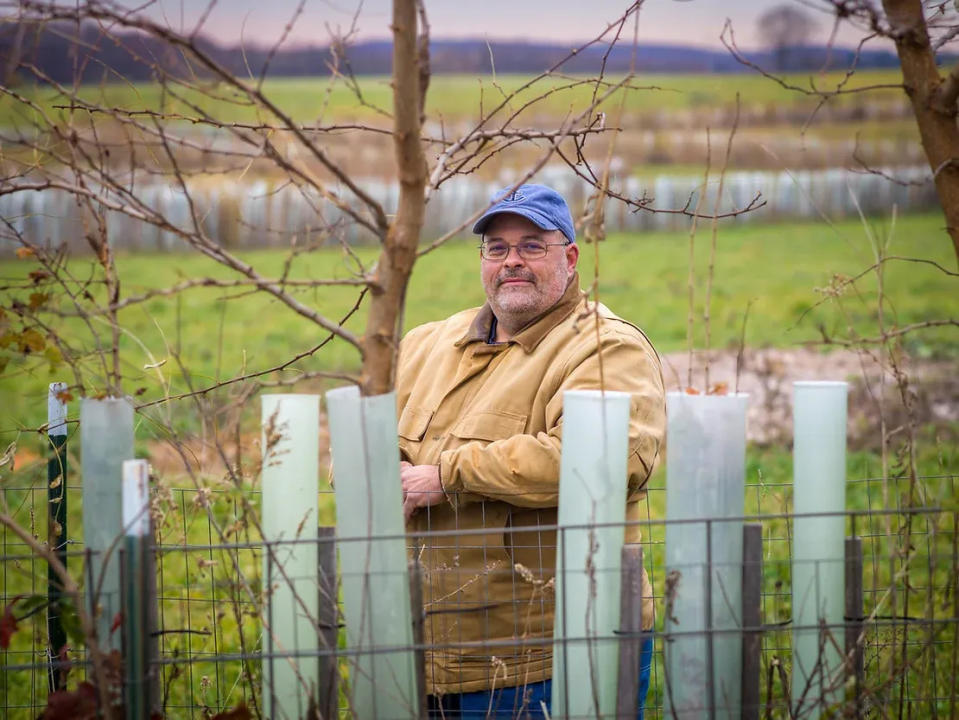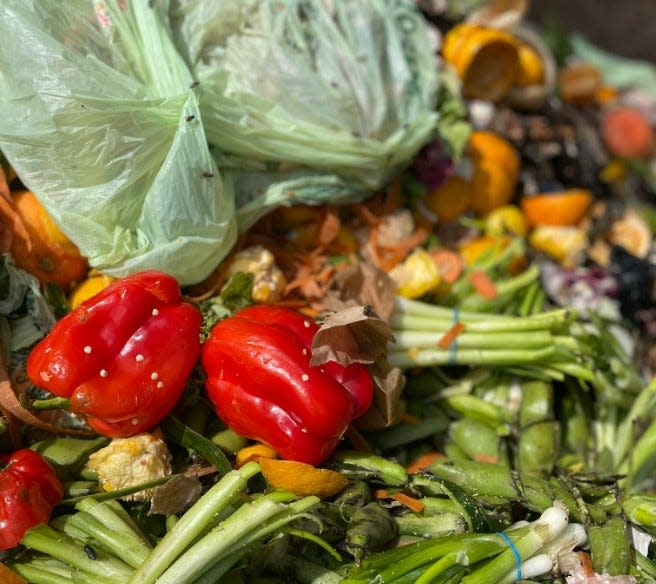Farmers would get green boost with composting bills headed to Wes Moore's desk. Here's how
For farmers like Keith Ohlinger, composting has been a way of life on his 22-acre property, and now a bill awaiting Gov. Wes Moore's signature aims to expand a zero-waste future.
As the owner and operator of Howard County's Porch View Farm LLC, reusing nearly all waste he and his family creates for the good of his tree and livestock farm has centered on compost created through a process of balancing nitrogen-rich, or "green" items, like some food scraps and used tea bags, and carbon rich, or "brown" items, like dry leaves and plants along with paper products.
Senate Bill 262, passed by the Maryland General Assembly this session, "requires the Department of the Environment to adopt regulations to exempt an on-farm composting facility from the requirement to obtain a permit if the on-farm composting facility uses 10,000 square feet of area or less for active food scrap composting," the bill states.

The legislation, which has been a decade in the making, also stipulates that the amount and source of some organic materials be recorded and maintained for five years.
Strong support from Shore Sen. Carozza
Sen. Mary Beth Carozza, R-Wicomico/Worcester/Somerset, cosponsored the legislation with Sens. Jason C. Gallion, R-Harford/Cecil, and Katie Fry Hester, D-Howard/Montgomery, calling it a chance to deal with environmental concerns.
More on bioenergy on the Eastern Shore Sussex bioenergy facility draws mixed reaction from environmental groups, residents
“Having diverse options to meet our environmental needs is incredibly important, and that includes the benefits of composting," Carozza said. "Now, farmers on the Eastern Shore who have their own composting facilities will be able to get a better mix of materials from off-site food scraps and encourage other farmers to get involved. Composting is a growing industry, as seen by Garvey Heiderman’s company Go Green OC."
Carozza also noted while the company launched in Summer 2021, it had already expanded to have over 30 participating restaurants. According to the state senator, Go Green OC collected 115 tons of food waste last year, and Garvey is expecting to collect 300 tons this year.
Myths and methods of compost

Misconceptions about composting abound when the public considers not only saving their trash but separating it into a nitrogen and carbon piles.
"I'll have folks out here and I show them how to compost and part of it is just getting educated," Ohlinger said. "When you do it correctly, it doesn't have a bad odor and you don't have problems with bugs or rodents. When people learn, they can make it on their property and spread it on their own yard. If they live in an apartment, they can take it to a community garden."
Ohlinger explained the process for his expansive property starts with using wood chips, straw and other vegetation, manure and charcoal to create biochar mixed with the compost that is collected. A closer look through a nutrient analysis tells him if the balance is correct.
If it is, the next stop is the fields, where it takes the place of expensive fertilizer purchased from a third party. The process also helps manage the animal waste that is never in shortage on a working farm.
"This helps with soil fertility and Maryland has nutrient management on farms. So there's a limit to the amount of soil amendments you can add. As long as I can remember, my family has composted. It didn't take long for us because we already had the nitrogen from the manure, and we just needed the carbon material," Ohlinger said.
More on recycling in Ocean City Why Ocean City won't return to recycling program despite controversy
Woodchips, too, were plentiful as they were a key component of animal bedding and mulch for the trees.
As one of the many supporters of the legislation, seeing it finally arrive on the governor's desk was worth the wait, and Ohlinger conceded getting members of the General Assembly on board was a process in itself. Considering that composting has been traced back to agriculture as far back as 40 centuries ago, he noted it was time Maryland backed the idea.
"I hope composting goes more mainstream and I would like to see everyone have their own little compost pile they (make). If everyone is doing their part to keep their food scraps out of the landfill, then that's just less that's going there in general," Ohlinger said.
Strong environmental support for composting measure
Emily Ranson, Maryland director for Clean Water Action and Clean Water Fund, noted the successful passage of such legislation could serve as a catalyst for a bevy of other environmental wins.
"One of the best methods to decrease greenhouse gases is to remove the organic waste from landfills that just sits and creates methane. You can put that back into the soil and that's compost. If you're a farmer making your own compost to use it on your land, it's vital to have the right mix of 'green' and 'brown' components," Ranson said.
Under the current permitting exemption, Ranson noted, that can be difficult due to a heavy carbon ratio. Balancing that out means backing legislation seeking to incorporate more food scraps.
"People don't really understand how it works. So there seems to be this misperception there's going to be big piles of rotting food on the ground and that scares many people. One of the things we had to work on was addressing that with guidelines to (help the public)," Ranson said.
More on Delmarva Peninsula farming Virginia Shore farmer is rooted in nature and heritage
This article originally appeared on Salisbury Daily Times: How new Maryland composting bills could give farmers big green boost

